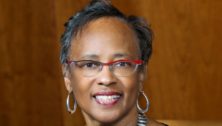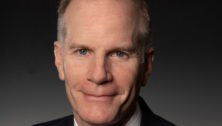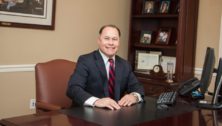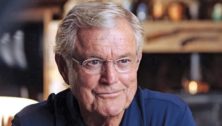Delaware County Leadership: U.S. Congresswoman Madeleine Dean
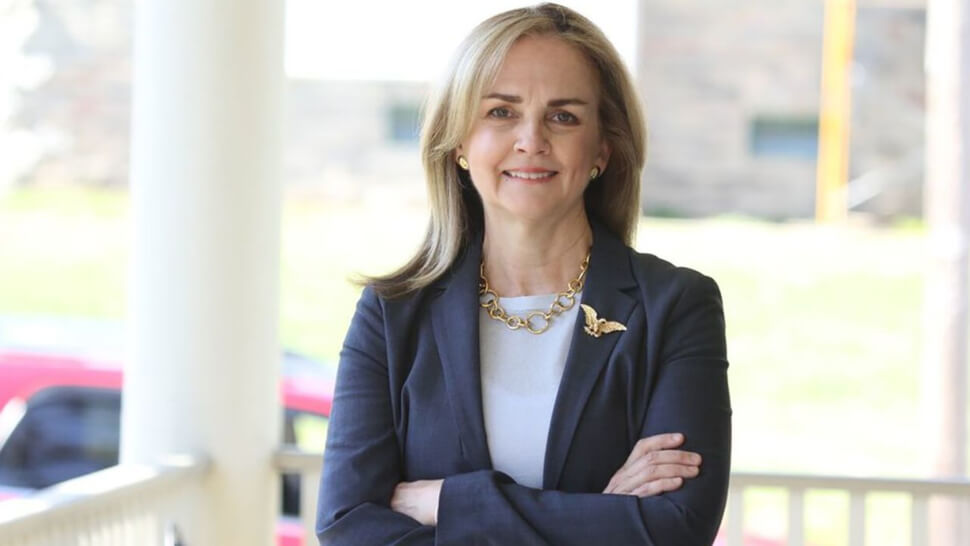
U.S. Rep. Madeleine Dean, who represents Pennsylvania’s 4th congressional district, a district that includes almost all of Montgomery County and a small sliver of Berks County, spoke with DELCO Today about growing up in Glenside as the youngest of her parents’ seven children; graduating near the top of her class at Abington High School; commuting to La Salle while living at home and working to help pay for her education; and pivoting from a potential career as a high school English teacher to attend law school at Widener.
Dean also spoke about recently attending the funeral of a woman who was instrumental in getting her involved in politics; why she feels fortunate to be on Capitol Hill at this moment in history; and the opportunities and challenges she’s focused on in 2022.
Where were you both, and where did you grow up, Madeleine?
I was born the youngest of seven kids to Mary and Bob Dean and raised in Glenside, Montgomery County.
What did your parents do?
My mother was a proud homemaker. She was college-educated and bright and did some writing on the side. She was an only child who went on to have seven children, so that was a full-time career for her.
My father was a brilliant, funny, and talented guy. His career was in the pharmaceutical industry. At the time of his death, he was Vice President at SmithKline. He spent twenty years there. He was a renaissance man and a gifted writer. On the side, he published hundreds of articles in various news outlets, including the Evening Bulletin and The Inquirer here in Philadelphia.
What memories do you have growing up in Glenside?
Fantastic ones! For a family of seven growing up in that era, it was sometimes chaotic in our house. Even growing up in the era of Vietnam, Watergate, drugs, and much more, so there was always something happening in the country, but in our community, we were always focused on one another.
The neighborhood at that time was teeming with children, and we were not alone in having a big family, and there were very talented, caring parents. I am forever grateful to my parents for raising us there.
Did you play any sports growing up?
I was not talented at all in sports. I desperately wanted to be an athlete, so I tried out for softball, and after four days of practice, the coaches came to me and said I should do something else. Later, I learned I was named “scholar-athlete,” they must not have realized I was not on the team.
Did you do any other extracurricular activities in high school?
I volunteered at St. Joseph’s, which was a nursing home for nuns, and worked in the cafeteria. I was a member of several clubs at Abington High School but nothing terribly exciting.
Was the life of a nun at all attractive to you as an Irish Catholic girl growing up?
Oh, goodness, no. I knew I never wanted to be a nun, just like I knew I never wanted to be a doctor.
Still, an important part of my upbringing and adulthood was my uncle Walter Dean’s influence, who was a Roman Catholic priest. I counted him as a dear friend. He lived with us at the end of his life. I certainly prize my faith but was never interested in becoming a nun.
What music did you listen to growing up?
Our house was filled with music, especially with my older brothers and sisters. My older siblings took my sister and me to many concerts when I was a teenager. I saw The Rolling Stones, Chicago, and the Beach Boys. I was a massive fan of the Beatles. Paul McCarthy remains my favorite artist.
Do you have a favorite concert that you went to that stands out?
I saw James Taylor once, and that was among my absolute favorites. I also saw Diana Ross and the Supremes.
Where did you go to college?
I was a good student in a class of 1,000 at Abington High School. I always knew I wanted to go to college. It wasn’t up for discussion in our family because my parents were big proponents of college education as graduates themselves.
With seven children, my college tour was quite limited. My sister was going to LaSalle University after my father and older brother, and I decided to go there as well. It wasn’t in our thought process to visit a host of schools back then. I was a commuter, lived at home, and worked throughout college.
Did you live on campus?
I knew I wanted to be close to home and continue to work, and that tells you something about my Glenside roots. I loved living at home and had a great relationship with my parents. I saw the challenges they faced, which drew me closer to them.
Looking back, was LaSalle a good school for you?
It was. Looking back, I wonder if I should have expanded my search to include top ivy league schools, but that’s silly. I received an excellent education at LaSalle and later taught there. The professors were superb, and they fit my needs for getting an education and fostered my desire to go to more education.
Unfortunately, my father died when I began my sophomore year at LaSalle.
That must have been a tough time for you. What got you through it?
An appreciation for what I had. My mother is a person of extraordinary strength. She knew she would go on and celebrate the wonderful life they had and surround herself with family. My father had a serious heart condition, so his death was not unexpected, while it was extremely sudden. Our family banded together, and we got through it.
You mentioned an additional degree?
I took an undergraduate legal course at LaSalle right before graduation and a lightbulb went on. I knew I no longer wanted to be a high school English teacher. I wanted to go to law school instead. My mother was excited and supportive, so I enrolled in Delaware Law School at Widener University.
Looking back over your career, who were the people who saw promise in you?
My parents would be number one. They encouraged me to do anything and be anything. I also had very supportive grandparents.
I started dating my now-husband while I was in college. He is a person who encouraged me and that the sky is the limit. He is an extraordinary, hardworking optimist.
What do you think your husband saw in you?
I don’t know! We met through politics of all things. I recently went to a funeral of the woman who was instrumental in getting me involved in politics, Dorothy Enright. She and her husband came to me when I was 18 and said I should run for office. I was friends with their daughter, and they asked me to run for committee person. It was from them that the seed was planted, and then through them and working in politics, I met my husband, who was elected committeeman at 19!
The lesson that I take from that is when you have good people in your life that see something in you and suggest a door, just try it! You have no idea where that might take you or who else might go through that same door after you.
What are the challenges and opportunities you’re focused on heading into the new year?
The challenge that I’m focused on as we near the anniversary of January 6th is the unification of our county to a greater degree. I know we will never be in lockstep, but how do we pull this democracy back together around a shared sense of the truth, an appreciation for the rule of law, and the beauty and fragility of our Constitution.
I think voting rights and everything to do with lessons to be learned from that havoc of the last several years is the greatest challenge ahead of us. I feel so fortunate to serve at this time.
In my presentation during the impeachment proceedings, I wrote that this happened on our watch. By that, I don’t mean every one of us is responsible. Still, we are responsible as elected officials and American citizens to recognize the damage attempted on our watch. We must put this country back together for our grandchildren and their children.
You said you were fortunate to be in your position in Washington at this moment. Why do you feel fortunate given everything that’s happened in the last few years?
I can’t think of more worthwhile work for me. There’s certainly meaningful work being done every day, whether it’s helping the homeless, educating our children, or vaccine distribution. For me, I can’t think of a more core to my DNA worthwhile work to be doing. I am just privileged to be here at this time to work for and serve others.
It’s something you prepared your whole life for.
In an unplanned way, yes. Being a lawyer, a teacher, and the chance to be a state representative. It worked out.
What other opportunities or challenges are you focused on? You visited Phoenix Correctional facility in Collegeville recently?
It was moving to visit a prison and talk about a piece of legislation that I am a champion of and had the honor to work with the late Elijah Cummings on called the PREP Act to educate incarcerated people and offer them the chance of a degree, training, a future, life, and meaningful work. I see a lot of opportunity in humanizing criminal justice reform.
The other opportunity that’s right before us is the extraordinary resources that we have, through the American Rescue Plan, the bipartisan Infrastructure and Jobs Act, and hopefully the Build Back Better Plan, to take our hard and human infrastructure forward in a much smarter way for our people, seniors, children, and the planet. There’s abundant opportunity there.
Two other areas that I hope to make a difference in. One is addiction and the opioid epidemic. I have a son who is nine years in recovery from opioid addiction. Last year, in twelve months-time, more than 100,000 people died of overdoses. That’s an epidemic in its own right that I hope we will humanely make a difference in.
The other area is gun violence. It’s been my calling since before I was ever elected to anything. We must do something about the scourge of gun violence in our country.
What do you do with your free time?
I wish I was able to do more walking. I like to walk and clear my head, but I don’t do that enough.
My husband and I spend as much time with my children and my grandchildren as we can. My grandchildren range in age from 6 months to 10 years old. We go to Cape May, New Jersey, together as a family when we can. I breathe differently there with my kids and the salt air.
What gives you hope, Madeleine?
I always see hope in children. They’re so bright and caring, filled with love and compassion. They have a passion for our planet and the opportunity to be educated. When I was sworn in for the first time in January 2019, my 7-year-old granddaughter at the time was absolutely caught up in the entire experience. She was so joyful and caught up in the happiness of that American moment.
Finally, Madeleine, what is the best piece of advice you’ve ever received?
Another person of influence throughout my life was my godmother Joan Cassin. When my mother passed, I would seek Joan’s advice. Joan was a native of the New York region, and we traveled to the city shortly after 9/11 and visited a pop-up memorial. We were walking back, and it started to rain, so we decided to get on a bus. At the time, buses took quarters, and I didn’t get on the bus because I didn’t have any quarters. She told me to get on and that we’d find the quarters later.
A couple of months later, I went to her with a dilemma I debated while teaching as an adjunct and offered a full-time position. She told me that her advice was the same as that day in New York, “get on the bus; you’ll find the quarters later.” The opportunity is right in front of you; the quarters are the smaller things.
‘Don’t let an opportunity – like that bus – pass you by,’ was good advice that I use in many ways in my life when I decide whether an opportunity is a good risk.
___________
Publisher’s Note: Laura Manion Contributed to this leadership profile
Join Our Community
Never miss a Delaware County story!
"*" indicates required fields

















![95000-1023_ACJ_BannerAd[1]](https://delco.today/wp-content/uploads/sites/3/2023/03/95000-1023_ACJ_BannerAd1.jpg)










